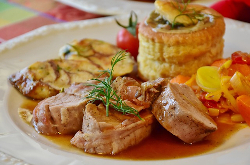돼지고기

Today we talk about animals--and animals we eat. In English, these two categories often have different names. Pigs turn into pork. Cows turn into beef. Sheep is mutton. Calves are veal. And deer is venison.
But why do we call these animals different names when we prepare them for a meal? Why is it “pig” on the farm but "pork" in a sandwich?
The answer is the Norman Conquest of Britain in 1066. That is when many French words became part of the English language. Many of those French words related to the battlefield, such as “army” and “royal.” Many related to government and taxation. And many others related to food.
When animals were in the stable or on the farm, they kept their Old English names: pig, cow, sheep and calf. But when they were cooked and brought to the table, an English version of the French word was used: pork (porc), beef (beouf), mutton (mouton) and veal (veau).
On several websites, word experts claim that this change shows a class difference between the Anglo-Saxons and the French in Britain at the time of the conquest.
Because the lower-class Anglo-Saxons were the hunters, they used the Old English names for animals. But the upper-class French saw these animals only at mealtimes. So, they used the French word to describe the prepared dishes. Today, modern English speakers -- regardless of social class -- have come to use both.
The words “deer" and "venison," however, are a bit more complicated.
Etymology Online says "venison" comes from an Old French word from the 1300s (venesoun) meaning "'meat of large game,' especially deer or boar." And that Old French word comes from a Latin word (venation) meaning "a hunt, hunting, or the chase."
Following the Norman Conquest of 1066, any hunted animal was called venison after it was killed. And probably because deer were killed more than any other animal, “venison” came to mean “deer meat.”
The words “chicken” and “fish” remain largely unchanged.
However, sometimes we use the word "poultry" when talking about buying a chicken, turkey, or other similar bird to eat. For example, a grocery store may have a place called “the poultry section.”
But we don't use "poultry" when we order chicken or turkey at a restaurant, or serve it as a meal. We simply say "chicken" or “turkey.”
For example, if I want to order my favorite dish, which is popular in the southern part of the United States, I will say, "I’ll have the chicken and waffles, please." I would never order "poultry and waffles."
Lesser common birds, such as quail and pheasant, simply go by their own names.
The French word for "fish" is "poisson." Some word experts suspect that "poisson" is too close to the English word "poison" to become a common food word.
After all, even the food-rich culture of France cannot overcome the fact that eating poison might kill you or at least make you sick. As a result, anything that even sounds like “poison” will probably be an unpopular choice at mealtimes.

